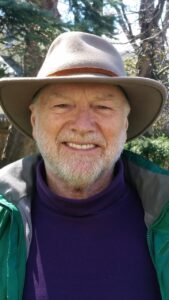
Photo credit: Julie Whelan
Gerry Whelan once won a hitchhiking race across the country, competing against his new girlfriend and arriving just half an hour before her. They joined forces for the trip back and are still together more than fifty years later.
Novel Incubator Year: 2
Current Project: A road-trip comedy about a retired teacher who believes he’s Abraham Lincoln, and his sidekick, a time-traveling 19th-century anarchist/Free Love agitator, Angela Tilton Heywood (1840–1935)
Tell us about a book you can’t stop talking or thinking about.
Sport of Kings by C.E. Morgan. Published in 2016, this book was an instant—and, despite excellent reviews, instantly ignored—classic, as potent as anything by Faulkner and Morrison. The saga of a Kentucky family grown wealthy by breeding thoroughbreds, this is not “just a book about horse racing.” It’s an epic about America’s ongoing curse: white supremacy and the aftereffects of slavery. Morgan, a fearless writer of epic ambition, sees connectedness everywhere—between genes, geography, the Ohio River, pioneers, migrants, fugitives escaping slavery, Cincinnati, the poor Black laborers who built it, and those laborers’ descendants, one of whom plays a pivotal role in the novel. She imbues her characters, Black and White, with utter authenticity, ignoring strictures regarding cultural appropriation. It’s a shame how unread this book apparently remains. I hope you’ll read it!
What’s the origin story of your Incubator novel?
I was correcting papers when my colleague, a French teacher, told me about an article in a Franco-American newspaper about a French-speaking hobo who’d migrated to the U.S. The hobo wandered for decades through southern New England and eastern New York. Over time, he became a legendary figure because he wore only leather, patched together, almost like a suit of armor (hence his name, “the Leatherman”); he walked the same circuitous route, always completing it in 34 days (townspeople set their clocks by him); and nobody knew his backstory.
Instantly hooked, I told my colleague: “I think I’m gonna write a novel about him.”
As a Dante freak, I associated the Leatherman’s circuitous route with the nine circles of Hell, the seven terraces of Purgatory, etc. The working title was The Man Who Walked in Circles. Naturally, “my” Leatherman, and my story, evolved. (Thanks, Incubator friends!) It’s now The Love that Moves the Stars (from the last line of the Divine Comedy), a love triangle involving Honeybee, an irrepressible homeless woman; Virgil, a repressed gay librarian; and the Leatherman.
What’s your greatest struggle on the page? What would others say is your strength?
My biggest struggle is composing sentences that pass muster with me because I can be a neurotic perfectionist and a fanatic for clarity. Usually I enjoy the struggle, but sometimes I’ll get so stuck on a sentence (rearranging the load, adding, subtracting, adding even more) that it stalls out like an old, overloaded truck. At that point I should just junk it, but nooo, I’ll keep trying to make the damn thing turn over, usually with predictable results.
As for others’ opinion of my strength, maybe not surprisingly, folks seem to enjoy my sentence-level work—though friends will always let friends know when there’s a clunker to be junked.
What do you do for fun?
Hang out with my wife, my grandkids, my friends; study languages; play tennis (mostly against a brick wall—very therapeutic, and it never scowls or argues points); let myself be tortured by the Boston Celtics. I also love to travel, especially to non-English-speaking countries. But burdened by an environmental guilt complex lately, I’ve been doing most of my traveling by book, especially foreign-language novels. One of the pleasures in that is feeling I’ve escaped my identity, that I’m foreign. Another is it makes me read even more slowly than usual, and aloud. No, I’ll never be one who reads a book or three a week, thank God.
What is your favorite punctuation mark? Why?
Considering my earlier comments about sentence struggles, it’s obvious, isn’t it? It’s the period: that cherry on the sundae of your well-enough-formed sentence, that spiking of the ball, that mini-explosion of release. (Ah, there’s another—yes, yes, YES!) But where was I?
Another thing about the period: you can say it, too. “Junior, you can’t use the car, PERIOD!” What other punctuation mark works like that? A more somber, but still useful, function of the period, especially for writers, is as a symbol of finiteness. All things will end: the joyous struggle to write well, the writer, too. It’s important to remember, we’re all just players in a period piece.
Gerald B. Whelan is a lifelong resident of Boston. He earned an M.A. in Spanish at Middlebury College’s school in Madrid and taught modern languages at Boston College High School. His fiction has appeared in the Madison Review and his translations in Salmagundi. Gerry’s love of languages and of creative writing are of a piece: each in its way frees him to become other people. Contact him at whelan.geraldb@gmail.com.
Next Chapters is a biweekly feature spotlighting graduates of GrubStreet’s Novel Incubator program, which has been running since 2011.



